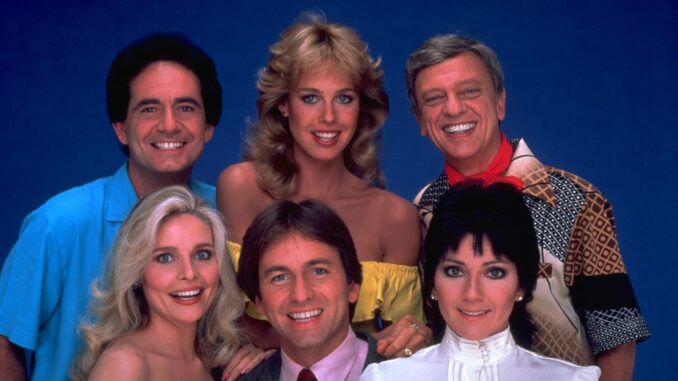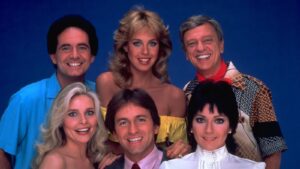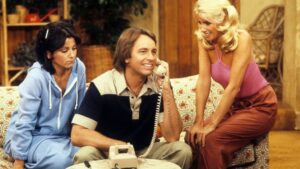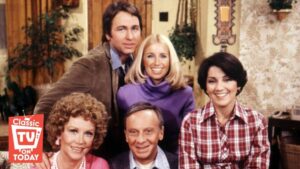
On Tuesday, a New York federal judge accepted David Adjmi’s word that his play 3C was a permissible parody of Three’s Company. In doing so, the judge granted him a legal victory against DLT Entertainment, owner of the 1970s sitcom starring John Ritter as Jack Tripper.
DLT asserted copyright claims after 3C ran for two months off-Broadway with Adjmi wishing to have his play, which explores the darker side of a gay man living with two women, put in book form.

After getting a cease-and-desist letter, Adjmi went to court asking for declaratory relief that 3C wasn’t a copyright infringement. He found support from the Dramatists Guild of America, which submitted an amicus brief that argued that “a ruling that 3C is not a fair use would have negative reverberations throughout the theater industry.”
U.S. District Judge Loretta Preska appears to have taken that message to heart with a highly detailed 56-page ruling that concludes with a pointed message.
She writes that the body of copyright law “is designed to foster creativity. It does so by, in effect, managing monopolies in knowledge: granting one in original work to reward its creator, but ensuring it is limited, temporary, and does not operate as a moratorium on certain ideas. The law is agnostic between creators and infringers, favoring only creativity and the harvest of knowledge. Here, ‘further protection against parody does little to promote creativity, but it places substantial inhibition upon the creativity of authors adept at using parody.’ ”
In asserting its hold on Three’s Company, which was one of television’s ten most popular shows on ABC from 1977 to 1984, DLT aimed to protect a series that gathered laughs from the miscommunication that resulted from a man pretending to be gay so as to live with two women and satisfy their crusty landlord. The series was loosely based on a British series, Man About the House, and as the judge notes, it was considered daring at the time.

According to Adjmi, his 3C was a comment on the “ways the television show presented and reinforced stereotypes about gender, age and sexual orientation” as well as “the times in which the show flourished — when sexual liberation had begun to reshape American society, and dominant cultural forces like television attempted to channel it in commercially profitable directions, while many forms of sexual oppression continued.”
DLT saw things differently, claiming that the play was a “poor adaptation” of the television series that nevertheless has “stolen not only the heart of the work, but every theme, detail, and character, thereby infringing Three’s Company’s exclusive right to prepare derivative works.”
Since Adjmi was claiming that 3C had fair use to Three’s Company copyrights, Judge Preska goes through the standard four-factor analysis to figure out whether fair use applied.
On the purpose and character of the use, the judge finds that 3C used the raw materials of the old television series, but added something new.
“Despite the many similarities between the two, 3C is clearly a transformative use of Three’s Company,” she writes. “3C conjures up Three’s Company by way of familiar character elements, settings and plot themes, and uses them to turn Three’s Company’s sunny 1970s Santa Monica into an upside-down, dark version of itself. DLT might not like the transformation, but it is a transformation nonetheless.”
The judge also finds Three’s Company itself to be “creative, even groundbreaking work,” going to the nature of the copyrighted work, but she quotes the Supreme Court as saying that the second factor is not “ever likely to help much in separating the fair use sheep from the infringing goats in a parody case.”
As for the third factor relating to the amount and substantiality of the portion used, the judge notes that “3C copies extensively from Three’s Company” and that DLT might be right that the play “copied many minor elements from Three’s Company, which had neither a parodic nor were necessary to evoke Three’s Company,” before adding that this can’t be analyzed in a vacuum.

Instead, she feels that the play’s transformativeness outweighs what was taken. Plus, on the fourth factor, she doesn’t see much harm to the potential market for Three’s Company. In maybe the most humorous passage of the decision, the judge writes, “Indeed, 3C appears to be intended for those who enjoy other of Adjmi’s ‘hard-edged,’ plays; and the Court is quite sure that a viewing of Three’s Company does not require one’s therapist. In light of the Court’s review of 3C and Three’s Company, and contempt
